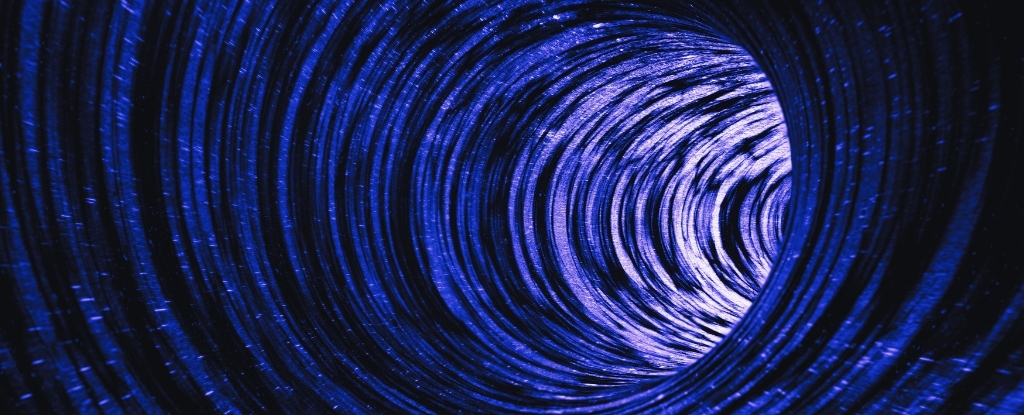A new study by astrophysicist Richard Lieu suggests that gravity can exist without mass, proposing thin, shell-like layers of ‘topological defects’ as an alternative to dark matter for explaining the gravitational binding of galaxies. This theory posits that these defects create a gravitational force without detectable mass, potentially eliminating the need for dark matter in current cosmological models
Lieu started out trying to find another solution to the Einstein field equations, which relate the curvature of space-time to the presence of matter within it. As Einstein described in his 1915 theory of general relativity, space-time warps around bundles of matter and streams of radiation in the Universe, depending on their energy and momentum. That energy is, of course, related to mass in Einstein’s famous equation: E=mc2. So an object’s mass is linked to its energy, which bends space-time – and this curvature of space-time is what Einstein described as gravity, a notch more sophisticated than Newton’s 17th-century approximation of gravity as a force between two objects with mass. In other words, gravity seems inextricably linked to mass. Not so, posits Lieu.
In his workings, Lieu set about solving a simplified version of the Einstein field equations that allows for a finite gravitation force in the absence of any detectable mass. He says his efforts were “driven by my frustration with the status quo, namely the notion of dark matter’s existence despite the lack of any direct evidence for a whole century.” Lieu’s solution consists of shell-shaped topological defects that might occur in very compact regions of space with a very high density of matter. These sets of concentric shells contain a thin layer of positive mass tucked inside an outer layer of negative mass. The two masses cancel each other out, so the total mass of the two layers is exactly zero. But when a star lies on this shell, it experiences a large gravitational force dragging it towards the center of the shell. “The contention of my paper is that at least the shells it posits are massless,” Lieu says. If those contentious suggestions bear any weight, “there is then no need to perpetuate this seemingly endless search for dark matter,” Lieu adds.
The next question, then, is how to possibly confirm or refute the shells Lieu has proposed through observations. “The increasing frequency of sightings of ring and shell-like formation of galaxies in the Universe lends evidence to the type of source being proposed here,” Lieu writes in his paper. Although he admits that his proposed solution is “highly suggestive” and cannot alone discredit the dark matter hypothesis. “It could be an interesting mathematical exercise at best,” Lieu concludes. “But it is the first [mathematical] proof that gravity can exist without mass.”
The study has been published in Monthly Notices of the Royal Astronomical Society.
I’m totally unqualified to comment on this, but something has always itched in my brain about dark matter. It smacks, to me, to be the aether of the 21st century.
Tbh I have always had the same feeling about the absolute limit of speed being the speed of light (and thus most of relativity). I have always been curious if the behavior we observe that lines up with the theory is something akin to transition energy in a material. Once a material reaches the appropriate temperature to phase change, additional energy is needed to actually change phases. If you were able to raise water to precicely 100°C and only impart exactly as much energy is lost to infrared radiation and other effects, it would never actually start boiling.
Hypothetically, of we were water mocules observing our environment, that transition energy might look like a hard barrier with no way to observe the other side. Same idea here, we see masses increase and time slow down based on acceleration, and it appears asymptotic, but there is nothing saying there is not some here yet undiscovered energy level where the fabric of space begins to behave differently and the transition to superluminal velocities becomes possible.
I really like that water molecule analogy. Personally, I have always viewed it as so feature of the topography of our universe in a higher dimension. Think about two two dimensional people living in a spherical plane. The furthest actual distance they could get from each other would be the diameter of the sphere. Yet they wouldn’t even know of the spherical nature of their universe.
I think it’s simply more a placeholder term for something people haven’t found out enough about yet.
It kind of is. It’s an extra variable introduced to account for a bunch of things that aren’t adding up.
Aether was the same thing, until people discovered electromagnetic fields. People knew light was a wave. Waves travel faster through more solid mediums. Light is pretty damn fast. Space is pretty empty.
Things didn’t add up. Light is simultaneously traveling through possibly the stiffest material in the known universe while also through nothing at all. People had to come up with Aether to try to explain that.
It was wrong, but it was an obvious placeholder acknowledging that something huge is missing from our current theories.
I’m not sure that they saw it as a “placeholder” at the time. It wasn’t until Mickelson and Morley demonstrated that the fixed frame of reference demanded by aether wasn’t there, paving the way for Relativity, that it was abandoned.
I don’t see people treating Dark Matter an a placeholder right now either.
But, like I said, I’m not qualified to comment.
Wait I didn’t know about this, that’s super cool.
The difference is that aether unraveled pretty quickly when we started seriously looking for it because experiments kept being outright inconsistent with what it was predicted we would see if it were there, whereas there are lots of independent lines of evidence that all point to the dark matter existing in the same page, so it really is not the same situation at all. The only problem with dark matter is that it doesn’t show up in our particle detectors (so far, at least), but there is no law of the universe that says that everything that exists has to.
Dark Matter isn’t a theory. It’s a feature of some theories to account for otherwise unexplained phenomena (galactic rotation curves, microlensing, the structure of the CMB) but no one knows what Dark Matter actually consists of. It’s basically a placeholder which is compelling for some reasons (theories without Dark Matter tend to explain some but not all of the above phenomena) but not compelling for others (unable to determine what the stuff is made of).
The aether came about by an argument from ignorance rather than the observations. Until the discovery of the wave-like nature of light it was believed that all waves travel in some medium, like the waves on water. Then it was assumed there must be some medium for light as well. But this was an invalid assumption without any evidence to back it up.
Aether came from observations of light moving through space while knowing there’s no air in outer space. The speed of light is then defined as the speed of light in ether, and it’s constant because it’s relative to the ether
Speed of light being constant in vacuum implies each observer perceives time and space differently. I’m sure you can see how 19th century physicists wouldn’t agree to this idea
The best way I’ve heard it put is “dark matter isn’t a theory, it’s a series of observed problems with our current model”
I’ve always wondered why people treat dark matter as a concrete fact. “Dark force” would be a better name, since we don’t even know that there’s matter there! We only presume it’s gravity keeping galaxies together and we only presume that it’s gravity due to matter. We also only presume that space is homogenous and that gravity has an equal effect across all regions of space.
Slightly related question: if mass/energy distorts space, creating gravity, why is radiation massless?
I don’t think it is. If there are photons bouncing around in a material it contributes to its mass. Thought it’s an interesting question, does a singular photon traveling through space warp spacetime?
Also photons being defined as massless is the reason they can travel at the speed of light.
Photons have zero rest mass, right? They have mass while moving, don’t they?
It helps to realize that mass is just a bookkeeping label that we assign to the “internal” energy of a system, where the choice of what counts as being “internal” is somewhat arbitrary and depends on the level we are studying.
For example, if you measure the mass of the nucleus of some atom, and then compare your measurement to the sums of the masses of the protons and neutrons inside of it, then you will see that the numbers do not agree. The reason for this is that much of the mass of a nucleus is actually the energy of the strong force bonds holding the nucleons together.
But you can actually drop down another level. It turns out that the vast (~ 99%) majority of the mass in the proton in turn does not come from the quarks but from the energy of the gluon field holding them together.
And if you drop down yet another level, the quarks get their mass through their interactions with the Highs field.
So in short, it is energy all the way down.
So gravity is
the weak forceall forces scaled up?Uuh, reading up on the 4 forces again, there’s bosons and stuff. Looks like i simplified a few things in my memory.
Because radiation = photons.
To elaborate, photons do not have mass. Radiation has no mass. Because they have no mass, they can travel at the speed of light without distorting space and time.
And just to further clarify, even though they are massless, photons are effected by gravity. So they will whiz through space at C and then follow the curvature of space that’s around an object (which creates the warped lensing effect around stars) and continue on their way afterwards.
But they have energy, which distorts space too, no?
Okay, so hear me out here before shouting me down:
This is just kind of thinking “around” the lack of observable Dark Matter, the fact that we haven’t detected any massive gravitational oddities when relating to mass, and the Einstein Field Equations. So it’s just kind of replacing the ‘m’ in the equation, but wouldn’t we be detecting this sort of thing literally everywhere by now? How would this justify something observable like Gravitational Redshift, because it would seem we would have noticed something like this for as long as we’ve had deep space telescopes, no?
I don’t understand any of this so this question isn’t snarky but something I’m actually wondering. How would we be able to see “topological defects” in space with telescopes?
Gravitational Redshift has been confirmed and observed. If there was a whole bunch of the gravity spheres just out in space hanging out, it seems we would have been able to confirm that similarly by observing large swaths of distorted space and red shifted light waves.
Isn’t the point of this that it explains the phenomena that is commonly attributed to dark matter? Therefore wouldn’t the things we observe that would point to this be the same things that we observe that point to dark matter? I guess the thing I don’t understand is why we would expect to observe something different because of this than what we attribute to dark matter.
This is a reimagining of e=mc2, without the m. It attempts to explain gravity and missing mass, but with these spheres instead of mass. Skips Dark Matter.
Hmm, I’m not sure how to correctly word my question.
It was really just aimed at the implication in the comment I replied to that if this were true, we should have seen evidence for it in telescopes already. So my question was, what phenomena would we expect to see because of these topological defects that we don’t already see and have attributed to dark matter.
As far as I’m aware (which really isn’t that far tbh) gravitational lensing is explained without needing any new hypotheses. But if dark matter was implicated in it to heighten the effect, that would still be something we have seen in our telescopes which could be explained by this so it still would answer the comment to which I replied as being something we have observed.
Edit: OK I looked it up and yeah dark matter (or another explanation) is required to account for the amount of lensing we see. But still, that’s a thing we have observed so I guess my question would be, does this new idea not account for the same effect? If it does, that should answer the comment I was replying to.
a thin layer of positive mass tucked inside an outer layer of negative mass
If the universe provides negative mass, maybe we could use it to build an FTL warp drive.
I suggested something like this in high school.
“If gravity is the deformation of space, and dark matter is matter that we expect to exist because of gravity, is it possible that dark matter isn’t real and instead we’re just seeing space deformed [on a local scope] without any mass?”
I’ve since been disuaded from this position by observations of dark matter between the remnants of collided nebulae, suggesting that whatever makes up dark matter doesn’t flow past itself as easily as diffuse gas. Unfortunately, I don’t understand the implications of my own conjecture enough to say if this was an expected result, but it seems unlikely.
Yeah apparently gravity can be caused by gravity, which is how gravitational waves work.
Gravity begets gravity.
I’m guessing they mean like in the absence of energy, right? Because can’t massless photons warp spacetime as the get to higher and higher energies?
Well E=mc² so makes sense both can have affect spacetime.
But this researcher seems to suggest gravity can exist in a void.

I’m going to have to hold my thoughts until I hear what Terrance Howard has to say about this
I don’t get the reference? lol
He can kill gravity apparently
Ah, okay. lol. Still lost, but less so.
My best guess was that he was the center of the universe (re: getting fired from Iron Man). lol
He has some wild ideas. Inventing new math ideas
What exactly is negative mass?
The weight of your brain. Gottem
deleted by creator
I didnt read it but i think its funny someone thinks this study is WILD
Huh… I’m not smart enough to comment on the validity of this but it seems interesting.
Basically my take on it. It’s a new
theoryhypothesis on gravity, but I’m not equipped to properly peer review it. For me, it’s an interesting read and is from a reliable source.It’s a hypothesis - we need to be able to test it before it can become a theory. Think of this along the same lines as the solutions of the field equations that allow for black holes to be wormholes, or the correct configuration of spacetime can allow you to travel through time.
It’s certainly interesting though
Thanks for pointing that out. Updated my comment. “Theory” has a specific meaning in science, so definitely don’t want to use that when it’s not.
Tangent: Whenever the news reports a major earthquake somewhere, I like to remind people that Plate Tectonic Theory is “just a theory” and that some religious leaders confidently assure us that earthquakes are caused by promiscuous women.
Almost missed this precious comment. TY for the smile.
My favorite of late was the congressman who said the eclipse was a result of our hedonistic ways. Surely the moon would move to a different orbit if we made trans illegal.
So what you’re telling me is we should be more hedonistic to get cool astral phenomena?
I think it’s just a shit stirring paper to say “look, here’s something that has zero observational evidence to its existence and look how ridiculous it sounds. Dark matter also has zero observational evidence, so why is that not ridiculous?” Which I’m not sure I agree with, but based on the faaar stretches he makes in the paper and the comments by the author later, that’s what I gather.
Source: I am a PhD student in physics
Can somebody explain how this helps us purge the galaxy faster?
Calm down Sovereign.
If those contentious suggestions bear any weight […]
HA!
I don’t understand either, but dark matter always seemed unlikely to me. It doesn’t make sense that we couldn’t see it and the particles that could explain it seemed like they were invented just to justify dark matter. When I heard of modified gravity it just feels more plausible. Plus it was fun in the last years because there has been a lot of back and forth between supporters and those who want to disprove it.
Now this! Cant wait to watch this on Sabine hossenfelders channel!
dark matter always seemed unlikely to me
Yeah, same. I’ve always assumed (and probably read somewhere, too) that “dark matter” is basically a placeholder for some yet unknown phenomenon/energy/etc.
Yes. Anything “dark” (dark ages, dark matter) just means we don’t know what it is, basically. There’s a lack of information, we can’t see more.
It doesn’t make sense that we couldn’t see it and the particles that could explain it seemed like they were invented just to justify dark matter
It always seemed like a natural assumption to me: the particles we know about were discovered because they interact with each other via at least one other force in addition to gravity. But there’s no other force common to all particles, so why not expect particles that only interact via gravity? They’d naturally be hard to detect, since gravity is so much weaker than the other forces.
Assuming that the only particles that exist are the ones that happen to be easy for us to detect feels like observer bias.
It’s not intuitive. Especially having so much of it. I don’t know, I’m not a physicist, the modified gravity made more sense to me, even though it seemed unlikely for a time. It’s again more popular today.









